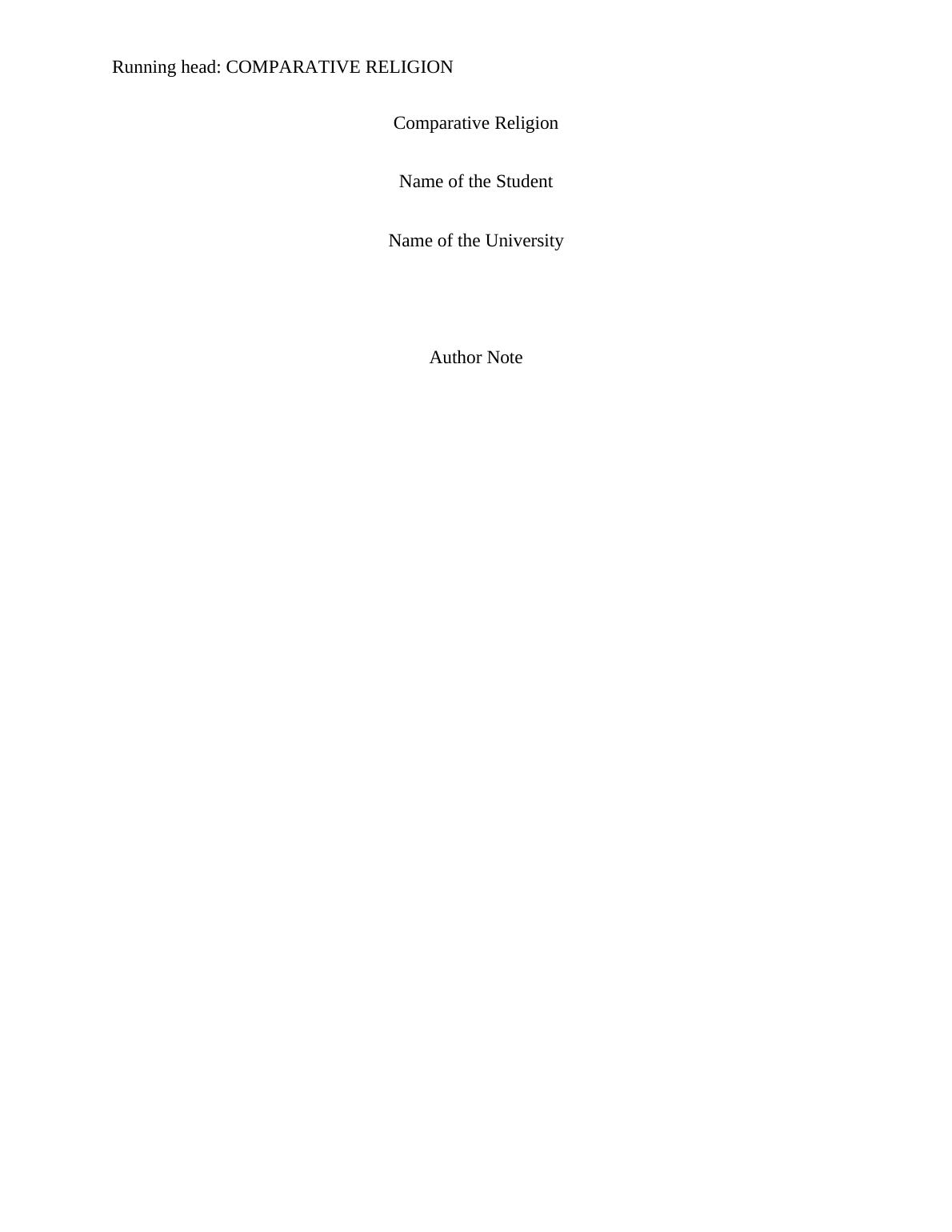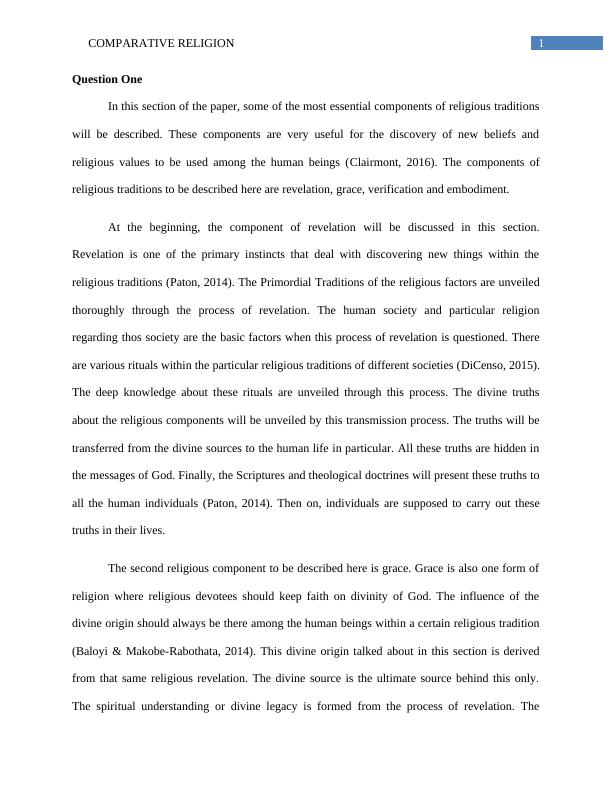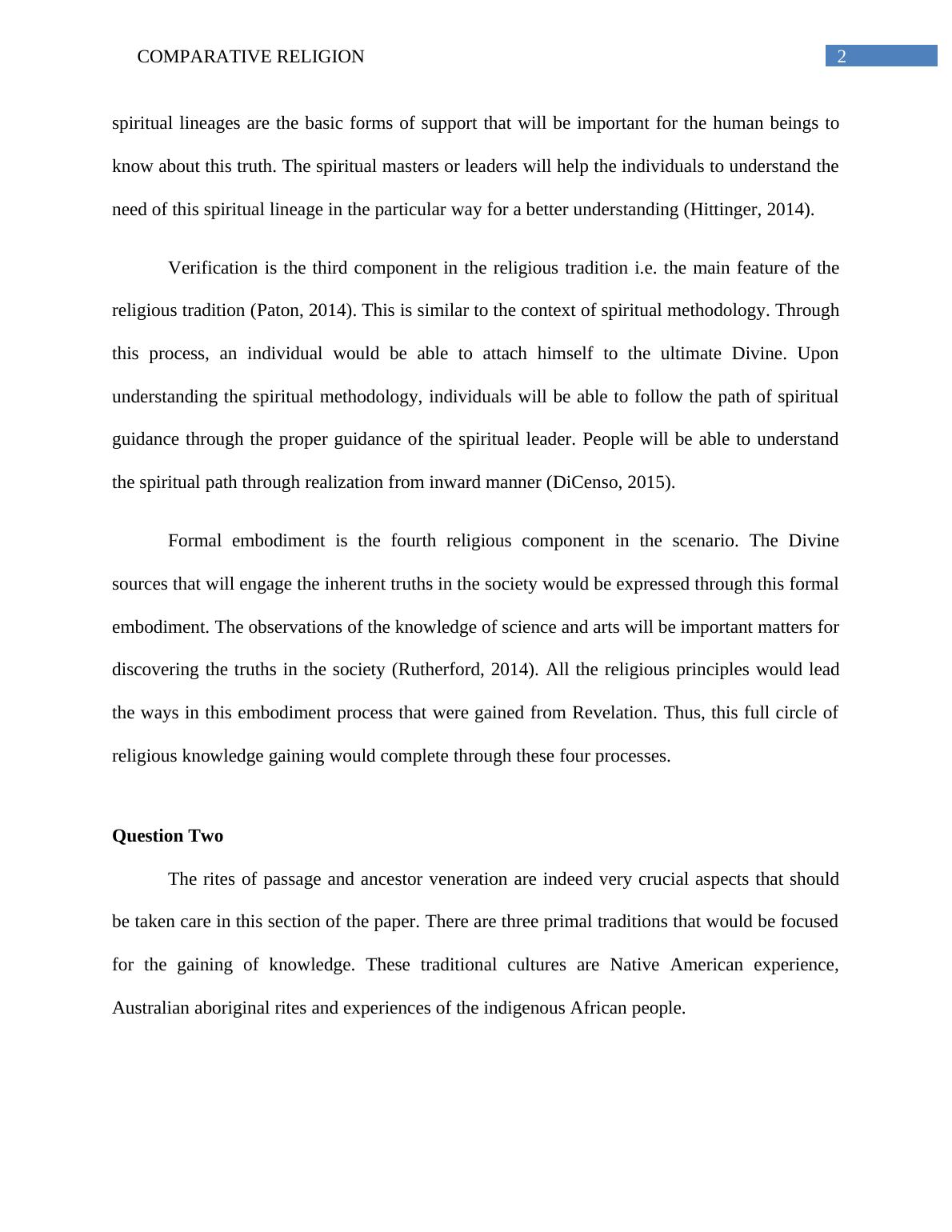Comparative Religion Assignment
Delivering essential factors to improve performance and achieve goals in the teaching profession.
8 Pages1797 Words22 Views
Added on 2022-08-08
Comparative Religion Assignment
Delivering essential factors to improve performance and achieve goals in the teaching profession.
Added on 2022-08-08
ShareRelated Documents
Running head: COMPARATIVE RELIGION
Comparative Religion
Name of the Student
Name of the University
Author Note
Comparative Religion
Name of the Student
Name of the University
Author Note

1COMPARATIVE RELIGION
Question One
In this section of the paper, some of the most essential components of religious traditions
will be described. These components are very useful for the discovery of new beliefs and
religious values to be used among the human beings (Clairmont, 2016). The components of
religious traditions to be described here are revelation, grace, verification and embodiment.
At the beginning, the component of revelation will be discussed in this section.
Revelation is one of the primary instincts that deal with discovering new things within the
religious traditions (Paton, 2014). The Primordial Traditions of the religious factors are unveiled
thoroughly through the process of revelation. The human society and particular religion
regarding thos society are the basic factors when this process of revelation is questioned. There
are various rituals within the particular religious traditions of different societies (DiCenso, 2015).
The deep knowledge about these rituals are unveiled through this process. The divine truths
about the religious components will be unveiled by this transmission process. The truths will be
transferred from the divine sources to the human life in particular. All these truths are hidden in
the messages of God. Finally, the Scriptures and theological doctrines will present these truths to
all the human individuals (Paton, 2014). Then on, individuals are supposed to carry out these
truths in their lives.
The second religious component to be described here is grace. Grace is also one form of
religion where religious devotees should keep faith on divinity of God. The influence of the
divine origin should always be there among the human beings within a certain religious tradition
(Baloyi & Makobe-Rabothata, 2014). This divine origin talked about in this section is derived
from that same religious revelation. The divine source is the ultimate source behind this only.
The spiritual understanding or divine legacy is formed from the process of revelation. The
Question One
In this section of the paper, some of the most essential components of religious traditions
will be described. These components are very useful for the discovery of new beliefs and
religious values to be used among the human beings (Clairmont, 2016). The components of
religious traditions to be described here are revelation, grace, verification and embodiment.
At the beginning, the component of revelation will be discussed in this section.
Revelation is one of the primary instincts that deal with discovering new things within the
religious traditions (Paton, 2014). The Primordial Traditions of the religious factors are unveiled
thoroughly through the process of revelation. The human society and particular religion
regarding thos society are the basic factors when this process of revelation is questioned. There
are various rituals within the particular religious traditions of different societies (DiCenso, 2015).
The deep knowledge about these rituals are unveiled through this process. The divine truths
about the religious components will be unveiled by this transmission process. The truths will be
transferred from the divine sources to the human life in particular. All these truths are hidden in
the messages of God. Finally, the Scriptures and theological doctrines will present these truths to
all the human individuals (Paton, 2014). Then on, individuals are supposed to carry out these
truths in their lives.
The second religious component to be described here is grace. Grace is also one form of
religion where religious devotees should keep faith on divinity of God. The influence of the
divine origin should always be there among the human beings within a certain religious tradition
(Baloyi & Makobe-Rabothata, 2014). This divine origin talked about in this section is derived
from that same religious revelation. The divine source is the ultimate source behind this only.
The spiritual understanding or divine legacy is formed from the process of revelation. The

2COMPARATIVE RELIGION
spiritual lineages are the basic forms of support that will be important for the human beings to
know about this truth. The spiritual masters or leaders will help the individuals to understand the
need of this spiritual lineage in the particular way for a better understanding (Hittinger, 2014).
Verification is the third component in the religious tradition i.e. the main feature of the
religious tradition (Paton, 2014). This is similar to the context of spiritual methodology. Through
this process, an individual would be able to attach himself to the ultimate Divine. Upon
understanding the spiritual methodology, individuals will be able to follow the path of spiritual
guidance through the proper guidance of the spiritual leader. People will be able to understand
the spiritual path through realization from inward manner (DiCenso, 2015).
Formal embodiment is the fourth religious component in the scenario. The Divine
sources that will engage the inherent truths in the society would be expressed through this formal
embodiment. The observations of the knowledge of science and arts will be important matters for
discovering the truths in the society (Rutherford, 2014). All the religious principles would lead
the ways in this embodiment process that were gained from Revelation. Thus, this full circle of
religious knowledge gaining would complete through these four processes.
Question Two
The rites of passage and ancestor veneration are indeed very crucial aspects that should
be taken care in this section of the paper. There are three primal traditions that would be focused
for the gaining of knowledge. These traditional cultures are Native American experience,
Australian aboriginal rites and experiences of the indigenous African people.
spiritual lineages are the basic forms of support that will be important for the human beings to
know about this truth. The spiritual masters or leaders will help the individuals to understand the
need of this spiritual lineage in the particular way for a better understanding (Hittinger, 2014).
Verification is the third component in the religious tradition i.e. the main feature of the
religious tradition (Paton, 2014). This is similar to the context of spiritual methodology. Through
this process, an individual would be able to attach himself to the ultimate Divine. Upon
understanding the spiritual methodology, individuals will be able to follow the path of spiritual
guidance through the proper guidance of the spiritual leader. People will be able to understand
the spiritual path through realization from inward manner (DiCenso, 2015).
Formal embodiment is the fourth religious component in the scenario. The Divine
sources that will engage the inherent truths in the society would be expressed through this formal
embodiment. The observations of the knowledge of science and arts will be important matters for
discovering the truths in the society (Rutherford, 2014). All the religious principles would lead
the ways in this embodiment process that were gained from Revelation. Thus, this full circle of
religious knowledge gaining would complete through these four processes.
Question Two
The rites of passage and ancestor veneration are indeed very crucial aspects that should
be taken care in this section of the paper. There are three primal traditions that would be focused
for the gaining of knowledge. These traditional cultures are Native American experience,
Australian aboriginal rites and experiences of the indigenous African people.

End of preview
Want to access all the pages? Upload your documents or become a member.
Related Documents
Comparative Religions & Primal Traditions- Doclg...
|7
|1509
|34
Intersection Between Culture and Islamlg...
|9
|2503
|316
Journal Entry Part 2 - Sociologylg...
|5
|818
|140
